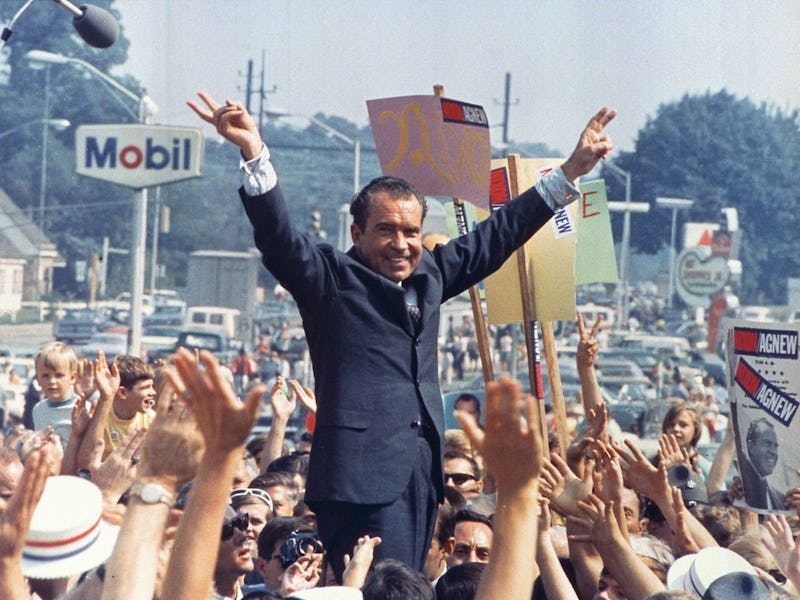Nixon Advisor Admitted the Obvious: War on Drugs Was a War on Blacks and Hippies
A new Harper's report explores the cause of Nixon's "war on drugs" and its consequences.

When President Richard Nixon declared a “war on drugs” in 1971 he ignited an avalanche of detrimental consequences including, but not limited to, mass incarceration in the United States, immense violence in Latin America, and the proliferation of systematic human rights abuses around the world. Was this political decree for the benefit of the health of the American people? No it was not, according to senior Nixon aide John Ehrlichman.
In the new April issue of Harper’s, journalist Dan Baum recalls a 1994 conversation he had with Ehrlichman, who died in 1999. When Baum asked Ehrlichman about the politics of drug prohibition, the Watergate conspirator waved away his question in favor of bluntness:
“The Nixon campaign in 1968, and the Nixon White House after that, had two enemies: the antiwar left and black people. You understand what I’m saying? We knew we couldn’t make it illegal to be either against the war or black, but by getting the public to associate the hippies with marijuana and blacks with heroin, and then criminalizing both heavily, we could disrupt those communities. We could arrest their leaders, raid their homes, break up their meetings, and vilify them night after night on the evening news. Did we know we were lying about the drugs? Of course we did.”
While this may seem more like a line out of The Manchurian Candidate instead of a real political strategy, evidence points to the fact that Ehrlichman was telling the truth. Drug reform advocates have long argued that drugs laws have always been based less on the science behind their ill effects and more on the people who are — often through propaganda — associated with them. And this fixation of associating a drug with a group of people didn’t just begin with Nixon — even in the 1930’s the first commissioner of the Bureau of Narcotics, Harry Anslinger, said that marijuana caused “white women to seek relations with Negroes” and that reefer made black Americans “think they’re as good as white men.” For years drugs have been used by people in power as the vehicle to disenfranchise people contesting that power.
History also reveals Nixon’s blatant bulldozing of scientific evidence on his path to defeat who he saw as his political enemies — the antiwar left and blacks. In 1973 he commissioned a scientific study on marijuana, hoping to add lab-backed credibility to his hard stance against drugs. Instead, the scientist behind the study concluded that marijuana was not a “danger to public safety” and wrote that it should not be criminalized. Nixon ignored the study, spent millions of dollars closing the border between Mexico and the United States to halt the flow of marijuana, and inadvertently primed Columbia to become the new distributor of marijuana to the United States.
Activists rally to end the war on drugs in 2013.
But it can’t be denied that Nixon was not successful in using the war on drugs to seriously harm the black community. President Ronald Reagan continued Nixon’s legacy by increasing the funding for the eradication of drug use and decreasing funding for education, prevention, and rehabilitation programs. Between 1980 and 1997 the number of people put in jail on nonviolent drug law offenses rose from 50,000 to 400,000. When arrests are broken down by ethnicity, studies show that white people are five times more likely to be using drugs than black people, yet black people are sent to prison 10 times the rate of white people for drug related offenses. The NAACP reports that black Americans represent 12 percent of the country’s total drug users, but make up 59 percent of those in state prison for a drug offense.
Baum opens his Harper’s piece with this information from Ehrlichman to make the argument that the time for the war on drugs to end is now. And the momentum for this stance is certainly moving in that direction — the legalization of marijuana is slowly spreading across the United States, and there is a slow advance of programs like Vermont’s state-funded heroin treatments. In March former U.N. Secretary General Kofi Annan called for the legalization of all drugs and in April the General Assembly of the U.N. will meet for the first time since 1998 for a drug conference. Even GOP presidential candidate Donald Trump has said that he thinks the legalization of marijuana should be a state-by-state issue.
How to go about legalization is a whole other debate of opinions — there’s not a agreement yet on the best way to legalize and regulate, while studies are conflicted on whether legalization would lead to an immediate rise in drug use and addiction. Baum cites a 2009 report by Britain’s Transform Drug Policy Foundation as a possible plan for implementation — the advocacy group recommends issuing licenses for buying and using drugs with sanctions for misuses, just like guns. Regardless, the war of drugs started for a dirty reason and its 46 years of failure means it is beyond pertinent that reform policies are implemented now.